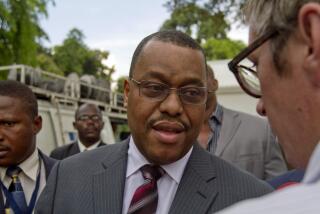Next Question Facing Haiti Leader: Timing of Elections
PORT-AU-PRINCE, Haiti — The new leader of Haiti has reached out to opponents and to the Roman Catholic hierarchy with the apparent intention of putting the deeply troubled nation on the road to a constitutional democracy, but the question of when to hold elections already has become a sticking point, one political leader who has met with him said Monday.
Lt. Gen. Prosper Avril, installed as president Sept. 17 in a “sergeants’ revolt,” appears reluctant to turn the government over to an elected civilian leader before 1990, while all major political groups want earlier elections, former World Bank economist Marc Bazin said.
Bazin, one of the top four presidential candidates in a failed attempt at elections last November, said he met with Avril on Saturday to discuss the timing and conditions of new elections. Another meeting between the two men, along with two of the other former presidential contenders, is set for today.
Bazin, the least hurried of the opposition political leaders, said he favors elections in about 18 months to give the army plenty of time to become accustomed to the idea.
“It must be a credible process that the army supports,” he said, ruefully recalling that it was army resistance that derailed last year’s election attempt.
Meanwhile, former candidate Louis Dejoie, who is scheduled to meet Avril today with Bazin and a third ex-candidate, Gerard Gourgue, said he will hold out for elections in less than 12 months.
New Army Hierarchy
“If the people who are making the new changes don’t do it fast, then we might lose it to a new hierarchy of the army,” Dejoie said, warning that although Avril has cashiered most of the old senior military officers, their replacements may soon consolidate a grip on power.
Gourgue, who represented a now-dissolved coalition of center-left groups last November, met Avril alone Friday but has not disclosed the substance of their talk.
A fourth leading former presidential candidate, Baptist minister Silvio Claude, saw the new president Thursday and said that Avril indicated he preferred to wait two to 2 1/2 years before holding elections. Claude, in contrast, said he proposed a vote within six months.
A leading behind-the-scenes political figure, human rights activist Jean-Claude Bajeux, said he thinks the delay that Avril seeks is “preposterous.” Bajeux said the coalition of civic groups that he represents will insist on elections in six to nine months when it meets the president later this week.
Despite the apparent differences among themselves and with Avril over the timing of an election, all four political leaders and Bajeux said they are optimistic about the present army leadership’s willingness to put the country on the track toward justice and democracy.
“I don’t think he (Avril) has any choice,” said Dejoie, who already has begun moving around the capital and its suburbs like an active candidate. “If the (army) leaders don’t pronounce themselves for change, the (sergeants’) revolution will go on.”
Bazin said that Avril’s actions in the nine days since the overthrow of army strongman Gen. Henri Namphy have inspired optimism among the political leaders, if only by their contrast with those of the Namphy regime.
In addition to meeting the politicians, he said that Avril sought a meeting last Wednesday with Haiti’s Roman Catholic bishops, prayed with them and received their blessing. In contrast, Namphy has been accused of ordering the burning of churches and the massacre of worshipers that touched off the sergeants’ coup.
On Sunday the bishops issued an urgent public appeal for prompt establishment of a judicial system to deal with the crimes committed during the violent past two years, to disarm thugs of the old Duvalier family dictatorship who are still at large and to reform public administration. Their statement called for “liberation” of the people but did not mention elections.
Although Avril has met privately with numerous individuals and groups since taking power, he has made no public remarks since shortly after the coup, when he said, “We dream of a Haiti where freedom flourishes, where human rights are guaranteed, a country where dialogue is the order of the day.”
More to Read
Sign up for Essential California
The most important California stories and recommendations in your inbox every morning.
You may occasionally receive promotional content from the Los Angeles Times.










